
Korea offers vouchers for medical AI app development
South Korea’s Ministry of Health and Welfare (MOHW) has offered vouchers to startups to support their development of AI-driven medical solutions.
In the four weeks from 16 July, it accepted applications for the voucher programme, which will provide funding of up to 400 million won (over $280,000) per project that will utilise data from a partner hospital to develop AI applications in healthcare.
The program aims to fund eight health tech startups and match each of them with a designated data provider hospital.
EMR storage for closed health centres launched
The Korean MOHW has also officially launched a national EMR storage system to securely hold and provide patient records from closed or suspended clinics and hospitals.
The system allows owners of closed medical institutions to transfer EMRs to government servers while patients can access their records, such as medical certificates and treatment histories, online.
The launch followed a pilot with 12 health centres from late December, which sought to resolve issues in retrieving EMRs and privacy risks.
Pakistan nursing institutes adopt AI platform
Following its collaboration with the Pakistan Nursing and Midwifery Council in May, California-based AI company MindHYVE.ai recently tied up with two educational institutions in Pakistan to help deliver AI-powered nursing education.
The Institute of Contemporary Studies and the National Excellence Institute signed a memorandum of understanding with the AI firm to introduce ArthurAI, which delivers interactive, adaptive learning content and provides personalised feedback to learners.
The partnership aims to contribute to efforts addressing chronic nursing shortages in the country by aligning curricula with global standards, producing a workforce equipped for modern healthcare delivery.
$450B APAC precision medicine investment over 10 years
New research expects precision medicine to drive $450 billion in direct economic investment in Asia-Pacific over the next decade.
A new white paper published by global management consultant L.E.K. Consulting also sees precision therapies creating 1.2 million skilled jobs and helping save around $39 billion in healthcare systems across four major APAC markets – Australia, China, Japan, and South Korea.
The paper also identified barriers to precision medicine adoption, including unclear reimbursement rules, limited clinician and patient awareness, and unfit infrastructure. These could be addressed through streamlined approval pathways, pricing and insurance frameworks, public-private collaboration, and targeted education, according to L.E.K.'s recommendations.

